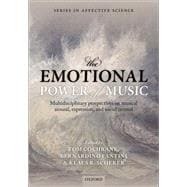How can an abstract sequence of sounds so intensely express emotional states? How does music elicit or arouse our emotions? What happens at the physiological and neural level when we listen to music? How do composers and performers practically manage the expressive powers of music? How have societies sought to harness the powers of music for social or therapeutic purposes?
In the past ten years, research into the topic of music and emotion has flourished. In addition, the relationship between the two has become of interest to a broad range of disciplines in both the sciences and humanities. The Emotional Power of Music is a multidisciplinary volume exploring the relationship between music and emotion.
Bringing together contributions from psychologists, neuroscientists, musicologists, musicians, and philosophers.
The volume presents both theoretical perspectives and in-depth explorations of particular musical works, as well as first-hand reports from music performers and composers.
The first section in the book explores how music can stimulate the emotions, considering the psychological and neurological mechanisms that underlie music listening. In the second section, the authors consider the expression of emotion within music, through both performance and composing. The third section explores how different societies have sought to manage and manipulate the power of music.
The book is valuable for those in the fields of music psychology and music education, as well as philosophy and musicology








